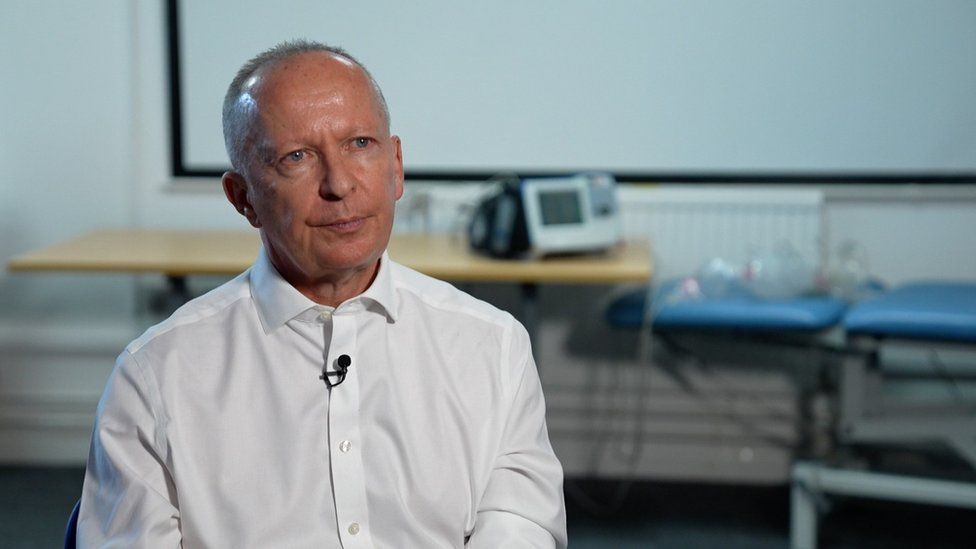ARTICLE AD BOX
 Image source, BBC News
Image source, BBC News
Glen Burley is chief executive of the Foundation Group - one of the largest NHS organisations in England
By Caroline Alton and Hugh Pym
BBC News
An agency providing last-minute freelance nurses to NHS hospitals is routinely charging up to £2,000 a shift, BBC News has discovered.
Glen Burley, chief executive of an NHS trust, said that Thornbury Nursing Services is targeting areas in England where nurses are in short supply.
He says it is "profiteering" from an overstretched NHS, but Thornbury says it offers a valuable, flexible service.
The government says new measures will end the use of expensive agencies.
Under NHS rules, hospital managers are obliged to use staffing agencies that work within an agreed framework, with a limit or cap on how much should be paid.
But when last-minute essential cover is needed, trusts may use off-framework agencies, such as Thornbury. These are not legally obliged to abide by pre-agreed pay scales.
Workload pressures in the NHS and a desire for more flexibility over shifts are thought to be driving more nurses to work for such agencies, which tend to pay the people on their books more while also taking a payment for themselves.
BBC News has discovered Thornbury charges almost £2,000 for a 12-hour bank holiday shift by a specialist paediatric nurse - an area of expertise where there are known staff shortages. Of that, BBC News calculates the nurse receives about £1,050 - meaning nearly £800 goes to the agency.
For a midweek afternoon and evening shift, the agency charges trusts £91.45 per hour, 85% above what the nurse is paid, at £49.50 per hour. Our calculations indicate that for a single Friday shift the trust is charged almost £1,000, of which £539 goes to the nurse, and £400 goes to the agency.
Thornbury also pays nurses their travel expenses, and charges the hospital separately for those costs too.
'No option'
Mr Burley is chief executive of the Foundation Group, one of the largest NHS organisations in England. It comprises South Warwickshire Trust, George Eliot Hospital Trust, Worcestershire Acute Hospitals Trust and Wye Valley Trust.
Speaking to the BBC, he says each of the four hospitals in the group is currently spending more than £500,000 a year on staffing provided by Thornbury.
He says although the group has reduced the amount it has spent, sometimes short-notice issues force its hand, especially in specialist areas like paediatrics and emergency care.
"Where you've got a critical service to continue, you have no option other than sometimes to go to these very high-cost agencies," he says.
Mr Burley says Thornbury is active in areas with nurse shortages and is offering such attractive rates that some staff are being tempted away from the NHS.
"I am sure they would say they are an agency of last resort and they are providing a service, but if that's created a bigger problem by pulling nurses away from the NHS, then that's certainly profiteering," he says.
'Flexible service'
Thornbury is owned by one of the largest companies in the agency sector, Independent Clinical Services (ICS), which in turn is controlled by Acacium, a company based in Jersey.
Company accounts show ICS turnover increased by 46% in 2021-2022, to nearly £400m. The company says less than 50% of that is related to Thornbury.
In a statement, Thornbury says: "We offer a valuable and flexible service that helps hospitals guarantee safe staffing levels.
"Requests are typically at very short notice - often as little as four hours before a shift is due to start. The level of rates necessarily reflects the last-minute and urgent nature of requests."
Thornbury, which covers England and Wales, has a sister company, Scottish Nursing Guild, which operates in Scotland and Northern Ireland.
Health experts say the continued growth in spending on freelance health workers reflects wider factors. Staff shortages in some areas have added to pressure on rotas and there is now a challenge for employers to try to persuade more staff to stay in the NHS rather than leaving.
Agency spending for health workers in England increased from £3bn in 2021-22 to £3.5bn the following year, according to the Nuffield Trust think tank.
Thea Stein, chief executive of Nuffield, says what agencies are able to charge is "probably not fair, but it is legal".
"The amount some agencies are charging does seem extraordinary. I don't blame any NHS trust - you have a safety critical service you need to fill a shift for - what else are they going to do?"
Chancellor Jeremy Hunt said in his recent Budget speech that he wanted to end costly off-framework agency staffing.
In a statement, the Department of Health and Social Care said: "NHS staff are prioritised when shifts need filling, and we are controlling spending by limiting hourly pay for temporary staff. "
It said an NHS workforce plan will see "an unprecedented expansion in training and a significant boost in retention, reducing the need to hire agency workers".
Related Internet Links
The BBC is not responsible for the content of external sites.

 1 year ago
101
1 year ago
101








 English (US) ·
English (US) ·